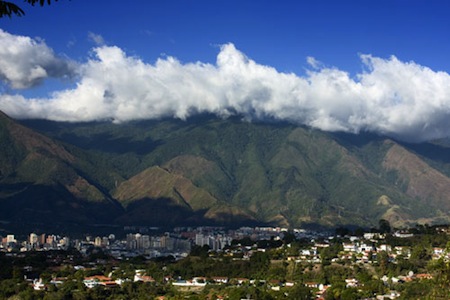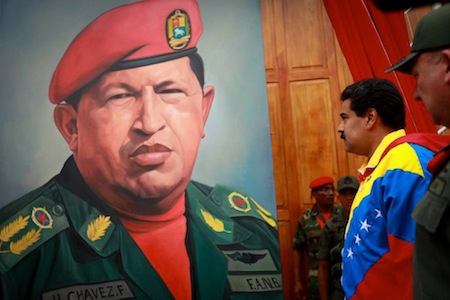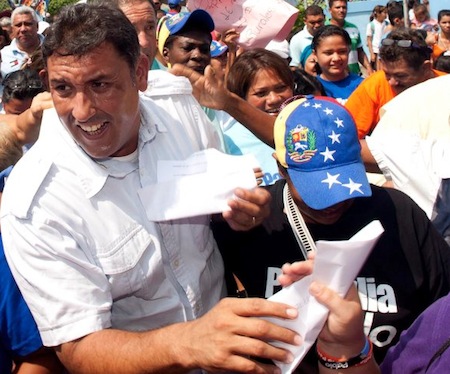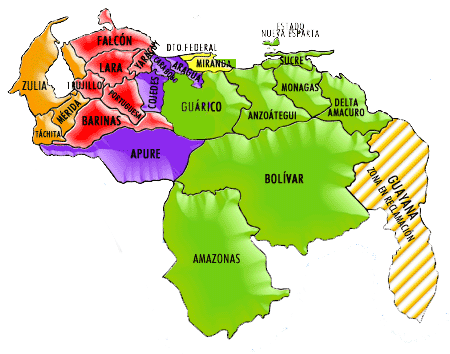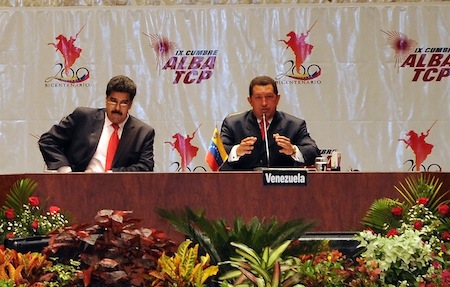If you already thought that Venezuela was the Turkmenistan of Latin American politics, you need no further proof than the latest stunt on Tuesday from acting president Nicolás Maduro.![]()
In the clip below, Maduro has launched an oversized check up to the heavens to a grateful Hugo Chávez, representing the dividends received by CANTV, the Venezuelan telephone company that Chávez nationalized in 2007. It’s another great find from Caracas Chronicles, which has been on quite a roll in the post-Chávez era in covering Venezuelan politics:
‘!Vuela, Vuela!, ¡en homenaje al Comandante!,’ Maduro exclaims (‘Fly! Fly! In tribute to the comandante!’), as red balloons (red symbolizing the color most associated with Chávez) float the check of 1,800 million bolívars upward to the skies.
As outrageous as it seems, it’s part of a series of impressions that the post-Chávez era is featuring an even creepier cult of personality in Venezuela than when el comandante was alive.
It began with the plans — now apparently aborted — to embalm Chávez and place him on display, just like Vladimir Lenin is on display in Moscow or Mao Zedong is on display in Beijing. Those plans were belatedly phased out after officials determined that officials had waited too long after Chávez’s death in order to embalm him.
Then there are the over-the-top tributes like this, mingling the legacy of Chávez with that of Venezuelan founding father Simón Bolívar and other left-wing martyrs, and even Chávez’s Cuban benefactors have a thorough celebration of his life at Granma.
Maduro even joked (or was it a serious claim?) that Chávez, his place in heaven secured, nudged God to make Argentine cardinal Jose Maria Bergoglio the world’s first Latin American pope.
It wouldn’t surprise me if, like in Turkmenistan, Maduro started trying to rename the months of the calendar after Chávez — there’s even a snarky website, madurodice.com, that tracks the number of Maduro’s mentions of Chávez on the campaign pre-campaign trail.
But the massive miles-long queues of people waiting to pay tribute to Chávez in death, and an extremely elegant funeral that drew nearly every leader in Latin America from Chile to México, with a ley seca (dry law) implemented to keep life in Caracas especially a bit more subdued in the potentially challenging days following Chávez’s death should have been enough to mark the extremely oversized impact that Chávez played within Venezuela’s political system — and above all in the spoils system that funneled oil wealth from the government to its supporters, from top government officials on downward.
All of this and Venezuela’s formal campaign season doesn’t even kick off until April 1.
French public intellectual Bernard Henri-Lévy has already decried the growing chavismo cult of personality:
What is less known, something that we will regret overlooking as the posthumous cult of Chávez swells and grows more toxic, is that this “21st-century socialist,” this supposedly tireless “defender of human rights,” ruled by muzzling the media, shutting down television stations that were critical of him, and denying the opposition access to the state news networks.
For Chávez supporters, there are certainly myriad policy reasons to support Maduro in the upcoming election over challenger Henrique Capriles — like him or not, he fundamentally transferred Venezuela’s oil wealth to the poorest Venezuelans in amounts unknown in nearly a century of the country’s oil wealth. You can argue that Chávez’s redistribution of wealth has been inefficient, that his expropriations and other economic policies have left Venezuela mired in debt, a pariah of the global financial system and ill-prepared for the day that oil prices drop, and that other more moderate regimes from Perú to Brazil have notched records of poverty reduction just as impressive as — or more so than — Venezuela under chavismo. Continue reading In death, the Chávez cult has become even creepier


